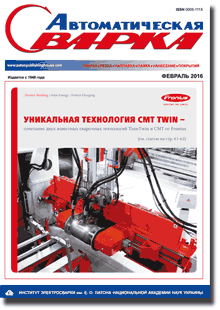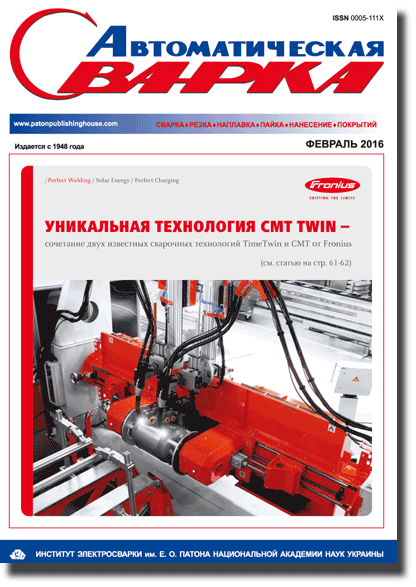| 2016 №02 (06) |
DOI of Article 10.15407/as2016.02.07 |
2016 №02 (01) |

Avtomaticheskaya Svarka (Automatic Welding), #2, 2016, pp. 48-53
Analysis of applicability of slag crust in production of agglomerated fluxes
I.A. Goncharov1, L.I. Fajnberg1, A.A. Rybakov1 and A.V. Netyaga2
1E.O. Paton Electric Welding Institute, NASU. 11 Kazimir Malevich Str., 03680, Kiev, Ukraine. E-mail: office@paton.kiev.ua
2NTUU «Kiev Polytechnic Institute». 37 Pobeda Ave., 03056, Kiev, Ukraine
Abstract
The use of wastes of fused and agglomerated fluxes is an urgent task. But as-applied to agglomerated fluxes the data on the effective use of slag crust are absent in the literature. In this work the analysis of possibility of using a slag crust of agglomerated fluxes for production of fluxes, providing the quality formation and high mechanical properties of weld metal at high-speed multi-arc welding of cold-resistant low-alloy steels was carried out. The comparative investigation of welding and technological properties of original flux OK 10.74 and experimental fluxes based on the crushed slag crust in single- and four-arc welding was carried out. Using the method of spectral analysis the chemical composition of weld metal was studied. The method of optical metallography was used to investigate the distribution of nonmetallic inclusions in them and characteristics of microstructure. The impact toughness of weld metal was determined by tests on impact bending. It was established that the flux, produced by the method of agglomeration with addition of 5 wt.% of metallic manganese into the composition of charge, was close to original flux OK 10.74 according to all the investigated indicators, and as to the level of impact toughness met the requirements for welded joints of cold-resistant gas-pipeline steel up to strength category X80 inclusive. The results represent interest to the consumers of flux from the point of view of improving the efficiency of its use in multi-arc welding of large-diameter pipes. 10 Ref., 4 Tables, 3 Figures.
Keywords: submerged arc welding, agglomeration, regeneration, nonmetallic inclusions, microstructure, impact toughness of weld metal
Received: 28.12.15
Published: 12.04.16
References
- Goncharov, I.A., Paltsevich, A.P., Tokarev, V.S. et al. (2001) About the form of hydrogen existence in welding fused fluxes. The Paton Welding J., 4, 27–30.
- Podgaetsky, V.V. (1961) How to use slag crust. Svarka, 6, 93–94.
- Kolisnyk, V.N., Galinich, V.I., Kuzmenko, V.G. et al. (1969) Slag waste recovery in pipe welding production. Ibid., 8, 66–67.
- Galinich, V.I., Kolisnyk, V.N., Kotenzhi, V.Yu. et al. (1964) Application of slag crust for melting of flux AN-60. Ibid., 11, 86–91.
- Kuzmenko, V.G., Goncharov, I.A. (1997) Peculiarities of slag crust formation in arc welding. Ibid., 12, 7–13.
- Goncharov, I.A., Tokarev, V.S., Kuzmenko, V.G. (1998) Development of flux of general purpose based on slag crust of flux AN-60. In: Advanced technique and technology of machine-building, instrument engineering and welding fabrication, Vol. 4, 227–231. Kyiv: KPI.
- Goncharov, I.A., Paltsevich, A.P., Tokarev, V.S. (2002) Low hydrogen welding flux providing higher resistance of welds to pore formation. Svarshchik, 1, 12–13.
- Murlin, D. (2010) The use of crushed slag as submerged arc welding flux. Welding J., 8, 41–44.
- Beck, H.P., Jackson, A.R. (1996) Recycling SAW slag proves reliable and repeatable. Ibid., 6, 51–54.
- Goncharov, I.A., Tokarev, V.S. (2005) Development of recovered welding flux on the base of slag crust of flux OR-132. In: of Int. Sci.-Techn. Seminar on Modern Welding Fluxes and Experience of Their Application in Industry (Zaporozhie, 29–31 Aug. 2005), 9, 10. Kiev: PWI.
The cost of subscription/purchase order journals or individual articles
| Journal/Currency | Annual Set | 1 issue printed |
1 issue |
one article |
| TPWJ/USD | 384 $ | 32 $ | 26 $ | 13 $ |
| TPWJ/EUR | 348 € | 29 € | 24 € | 12 € |
| TPWJ/UAH | 7200 UAH | 600 UAH | 600 UAH | 280 UAH |
| AS/UAH | 1800 UAH | 300 UAH | 300 UAH | 150 UAH |
| AS/USD | 192 $ | 32 $ | 26 $ | 13 $ |
| AS/EUR | 180 € | 30 € | 25 € | 12 € |
| SEM/UAH | 1200 UAH | 300 UAH | 300 UAH | 150 UAH |
| SEM/USD | 128 $ | 32 $ | 26 $ | 13 $ |
| SEM/EUR | 120 € | 30 € | 25 € | 12 € |
| TDNK/UAH | 1200 UAH | 300 UAH | 300 UAH | 150 UAH |
| TDNK/USD | 128 $ | 32 $ | 26 $ | 13 $ |
| TDNK/EUR | 120 € | 30 € | 25 € | 15 € |
AS = «Automatic Welding» - 6 issues per year;
TPWJ = «PATON WELDING JOURNAL» - 12 issues per year;
SEM = «Electrometallurgy Today» - 4 issues per year;
TDNK = «Technical Diagnostics and Non-Destructive Testing» - 4 issues per year.




